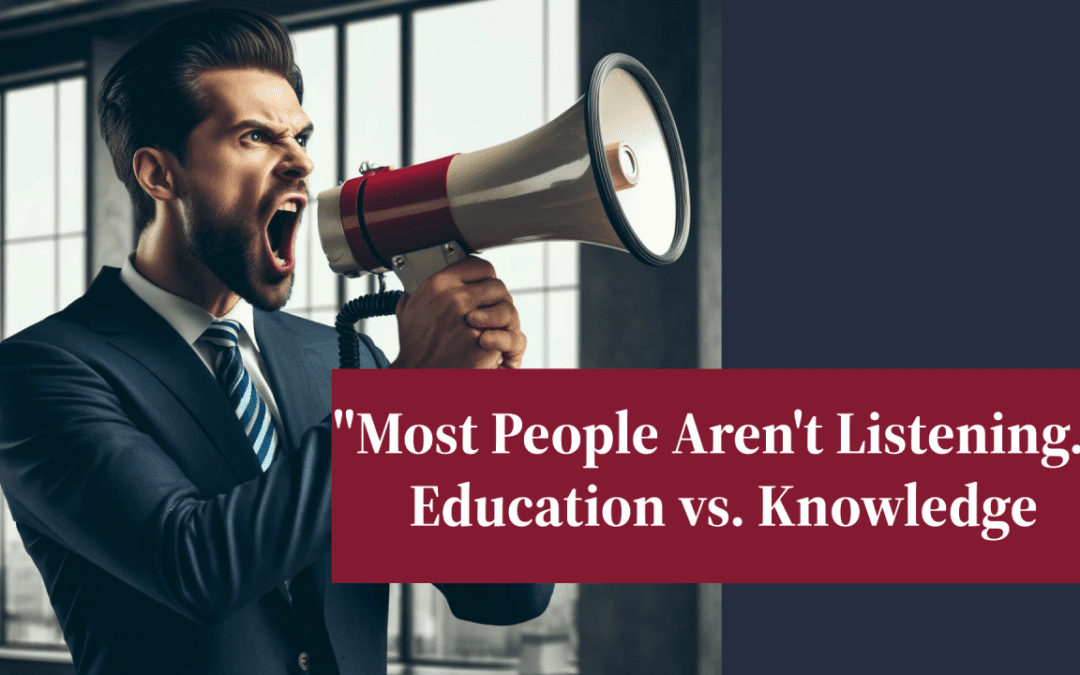“Josh, if you’re going to be any good at this job you’re going to need to learn one thing…”
It was our very first sales meeting.
I’d just been hired and was desperately looking to impress my co-founders with what “I knew” about sales.
I look back and wonder what that must have sounded like from Kirkland’s ears.
Kirkland Tibbels, one of the Co-Founders and Board Chair at Influential U, is a millionaire, with much of his fortune coming from years of sales and developing his sales teams until his company went public.
At around the age of 42, Kirkland had enough money to retire and set out to follow his dream of stand-up comedy and eventually became a well-known producer in Hollywood and the owner and founder of multiple businesses.
Me?
I was turning 35, hadn’t stayed in a job for longer than about 5 years, and had listened to and nerded out to a few dozen sales books and business podcasts, but outside of a single year in advertising, and working the floor at Guitar Center, I hadn’t even come close to selling anything of consequence. (Except maybe a couple of vintage guitars and a few expensive Taylor acoustic guitars to rich kids…)
It must have sounded like an ant screaming at a kid with a magnifying glass…
Kirkland finished, “…people aren’t listening, they’re waiting for their turn to talk.”
I think my tongue fell into my throat because I probably started to make a sound and hope I suppressed it… but I’m not sure if I was successful…
“Was he talking about me?”
He says he wasn’t… but I’m pretty sure that this kid with a magnifying glass just utterly destroyed my ant hill…
Education vs. Knowledge
Here are some definitions to get this inquiry going:
Education: the process of receiving or giving systematic instruction
Knowledge: facts, information, and skills acquired by a person through experience or education
One of my favorite phrases is “Knowing is doing”.
In other words- to know a thing, we must be able to do or demonstrate a thing, consistently.
Most people think that because they are “educated” on a subject it means that they are a subject matter expert.
I disagree.
Here’s an example- let’s say you’ve decided that you want to ride a motorcycle. You grab a few books on motorcycles — a book for how to be a motorcycle mechanic, one for how to ride motorcycles, one for different types of motorcycles, you read a blog on the history of motorcycles, and you even read all of the books, take notes, watch YouTube videos, hang out with motorcycle riders, interview them on podcasts, and ask them probing questions.
Cool.
In this scenario, you’ve educated yourself on motorcycle riding, but you still don’t actually “know” how to ride a motorcycle.
You can understand how to use the clutch and throttle, fill it with gas, and maintain it- but you still don’t “know” how to ride a motorcycle— however, you are educated on how to ride it, but that education is incomplete to achieve your goal.
(Helpful? Yes! Valuable? Yes! Knowledgeable? No.)
Until you whip your leg over the motorcycle start the engine, and ride motorcycles successfully and consistently, you don’t “know” how to successfully ride a motorcycle.
This lesson applies to many arenas — people will go and study and achieve a PhD in leadership, but until they actually lead a group to a successful outcome, recurrently — they’re educated and could even teach leadership and leadership theory, but until they actually lead a group to the completion of a successful project, they don’t truly “know” leadership.
The Point
It’s clear to me that many people become educated in topics and move around as if they know it. (You can probably think of many examples of this, in fact, many people are simply typing questions into Chat GPT, and acting like it was their own work… AND THEN act like they’re experts on a topic…)
Be careful of listening and following people who are simply educated on a subject- because depending on your aims, that “education” may not be enough.
I invite us to ask them to prove their knowledge with experience before we accept their teachings as factual and follow their lead. (And even then, when was the last time they led? Was leading to boomers 30 years ago the same as leading to millennials, today? It may be… but I doubt it…)
Here’s my takeaway, be careful to not rush to tell people what you “know”- wait until you can prove it.
Confidence that is not built on competence, is faulty and unproven.
We gain competence through practice.
Therefore, practice leads to competence which leads to confidence.
To me, this means that I must “practice” listening to those who have proved what I aim to do.
Simply regurgitating things I’ve been educated on is closer to the skills of a parrot than displaying actual “knowledge”.
This doesn’t mean my education isn’t valid or valuable, but it does mean that education alone isn’t enough to claim that we “know” a thing.
If you leave with one thing, I invite you to practice listening to those who have the knowledge to help you get where you want to go, because…
“Most people… aren’t listening… they’re waiting for their turn to talk.”

